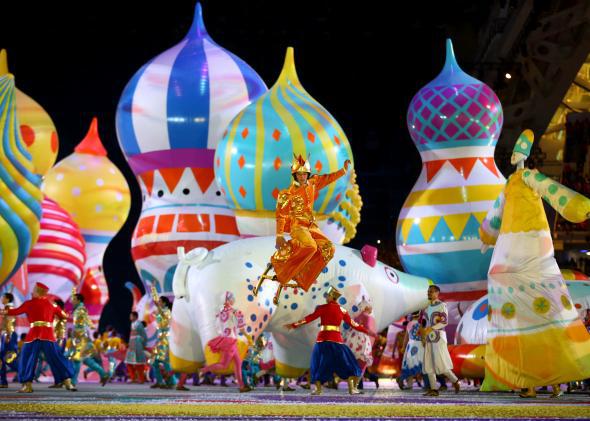Sochi may be 850 miles from Moscow’s Red Square, but Kremlinology—the art of deducing major news developments from almost imperceptible signals, as perfected at the May Day parades of the Soviet era—was alive and well at the opening ceremony of the 22nd Winter Olympics. Many of us approached the spectacle wondering if the carefully choreographed event would include any commentary on Russia’s hideously homophobic “gay propaganda” legislation.
In truth, explicit criticism of the Russian law was scarce. In his welcoming speech, IOC President Thomas Bach stressed the importance of “embracing diversity,” which isn’t exactly a radical statement. Nevertheless, his words were seized upon as a coded rebuke to Putin and co. (Others suggested he was directing his shade at the world leaders who stayed away from Sochi to protest the law.) Otherwise, the gay elements in the opening ceremony were probably visible only to those of us who are primed to see rainbows everywhere: It was in the bodies of the male ballet dancers (especially when they mimed playing the flute), in the music of gay composer Peter Tchaikovsky, in the rainbows on the German team’s uniforms, and in the very name of the Olympic flame. (Or maybe not. My colleague Simon Doonan found the entire spectacle profoundly, utterly, gloriously gay.)
Those of us alert to coded statements also noted the presence of Yelena Isinbayeva in the final group of athletes to carry the Olympic torch. Isinbayeva is indeed a great pole vaulter (a sport that appears in the Summer Olympics, it should be noted), and her trophy cabinet includes two Olympic golds, but she has also gained notoriety for an anti-gay attitude. At the 2013 World Championships, when asked about the anti-gay law, she said of her fellow Russians: “We consider ourselves as traditional people, when men live with women. If we will allow to promote and do all this stuff on the streets, we are very afraid for our nation.” (She later said she was misunderstood and blamed her poor English.)
Isinbayeva’s presence in the final six has been overshadowed by that of Putin’s alleged mistress, former rhythmic gymnast and current Duma member Alina Kabaeva, and another former champion and current Duma member, pairs skater Irina Rodnina, who is now better known as the woman who tweeted a racist picture of President Barack Obama and the first lady.
On second thought, maybe you don’t need to be a paranoid Kremlinologist to decode the messages that the Russians were transmitting in this opening ceremony.
